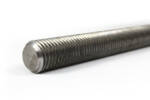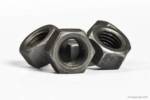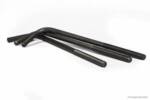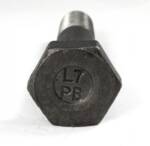ASTM FAQs
SS304 or SS316 Bolts
Can I order bolts to Type 304 or 316 stainless steel?Type 304 and Type 316 are very common stainless steel grades that just refer to a type of stainless steel. If you were to look for Type 304 or 316 stainless steel bolts in the ASTM Fastener Standards Manual you aren’t going to find them. That is because they are steel grades as opposed to... Read more

Thread Class for All Thread Rod
Is all thread rod produced with a Class 2A thread?There are three classes of thread fit associated with fasteners: Class 1A/1B, Class 2A/2B, Class 3A/3B. The “A” refers to the externally threaded fastener component, typically the bolt, while “B” refers to the internally threaded fastener component, usually a nut. As the number of thread class increases, the threading tolerances become more precise. Most construction... Read more

A194 Grade 4 vs. Grade 7 Nuts
What is the difference between A194 Grade 4 and A194 Grade 7 heavy hex nuts?While A194 Grade 4 and A194 Grade 7 nuts are mechanically identical and have the same intended applications, the only difference is the chemical values (aka steel used to manufacture). Grade 4 was created to be a low-cost alternative to Grade 7 by using a lower cost raw material. Unfortunately, this did not work out.... Read more
F3125 Grade A325 vs. A193 Grade B7
What is the difference between F3125 Grade A325 structural bolts and A193 Grade B7 bolts?A325 and A193B7 bolts are among the most common, mass-produced bolts available in the marketplace. It is a common misconception that these bolts are interchangeable since they have a lot of similarities in their configurations, and both are considered high-strength bolts. In fact, these bolts have two very different applications and have differences in their... Read more
The Meaning of UNO
What is the meaning of UNO?What is the meaning of UNO? UNO is an acronym that stands for, “Unless Noted Otherwise”. UNO is a blanket statement that covers all specified items related to the callout but leaves exceptions in specific situations. For instance, A325 bolts may be specified in the general notes, but a different fastener specification/grade may be specified... Read more
Measuring Round bend U-bolts
How does Portland Bolt measure round bend U-bolts?Portland Bolt measures round bend U-bolts based on the dimensions outlined in the Industrial Fastener Institute Standard IFI-136. The length (L) is measured from end of bolt to inside of the bend, while the width (C) is measured between the legs. Some companies will show the length to the bottom or centerline of the bend... Read more
Fine Thread Structural Bolts
Can A325 and A490 structural bolts be supplied with fine thread?No. The specification calls out that those bolts must be Unified National Coarse thread and have class 2A tolerances. The F3125/F3125M specification reads: 4.2 Threads: 4.2.1 Uncoated bolt threads shall be as specified in Table 1. 4.2.2 Coated bolts shall have threads meeting Table 1 requirements before coating. TABLE 1 Thread Fit, ASME 120 ksi... Read more

Plain Finish Bolts
What is a "Black" Bolt?The vast majority of bolts that Portland Bolt provides are either hot-dip galvanized or plain steel with no coating. In the construction fasteners industry, we typically refer to the plain steel as “black.” On our quotes and orders at Portland Bolt, we abbreviate that to “blk”. Other companies may refer to bolts with no coating... Read more
Fully Threaded Headed Bolts
Can Portland Bolt make fully threaded headed bolts?It depends. To answer this question, we have to go into the details about the different ways to we can thread a bolt. As well as different head styles. Roll Thread We can thread to within 2” of the head. We can thread up to 1” diameter bolts that are mild steel, stainless steel, or... Read more

A320 Grade L7 vs. A320 Grade L7M
What is the difference between ASTM A320 Grade L7 and A320 Grade L7M?ASTM A320 possesses several fastener grades manufactured from either alloy or stainless steel and are intended for cold temperature applications. Both Grade L7 and L7M are manufactured from a quenched and tempered alloy steel. While the chemical requirements for both Grades L7 and L7M are identical, there are several differences that separate the two grades.... Read more
